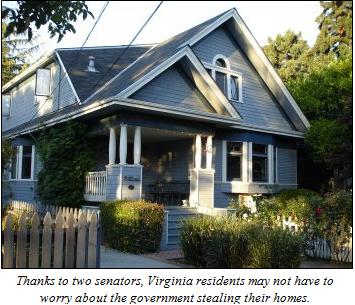By Isaac MacMillen

Virginia was one of those 42 states, passing legislation which limited the use of eminent domain to “public” uses. However, it left the definition of “public use” to the legislature, leaving room for the vital legislation to be undone by pernicious landgrabbers.
But Virginia Senators Mark Obenshain (R-Harrisonburg) and Ralph Smith (R-Botetourt County) have now proposed legislation that would enshrine these vital protections into the state Constitution’s Bill of Rights. The current Bill of Rights prohibits “any law whereby private property shall be taken or damaged for public uses, without just compensation, the term “public uses” to be defined by the General Assembly”—and some politicians have been busy torturing that term.
So the new Senate Joint Resolution 290 would replace it with the following:
“That the General Assembly shall not pass any law whereby private property shall be taken or damaged for public uses, without just compensation. The term “public uses” under this section shall be defined by the General Assembly. No more private property may be taken than necessary to achieve the stated public use.
“Private property may not be taken when the primary purpose is private financial gain, private benefit, an increase in tax base or tax revenues, or an increase in employment; however, this restriction shall not apply to the taking of private property for the creation or functioning of a public service corporation, public service company, or railroad.”
If passed, this legislation would outlaw the primary negative effect of Kelo—the taking of private property for private use. Additionally, it places limits on the amount of property that may be taken, even for public uses—and then, no more than absolutely necessary. All of which is a definite step in the right direction. However, there are two types of eminent domain this bill does not address: Regulatory taking and “blighting.” And the landgrabbers are already trying to exploit the loopholes.
A regulatory taking occurs when a government regulates an individual’s property to the point that the individual is not able to use his or her land in the most economically viable way. Essentially, individuals lose the right to use their property as they wish. While certain regulations (e.g. zoning laws) have been deemed by the courts to be acceptable, conservative lawmakers and jurists have long held that they should be viewed as the exception, and not the rule.
Similarly, governmental regulation can result in “blighting:” the devaluing of an individual’s property. Blighting can also occur from physical measures, an extreme example being the building of a jail next to the private property in question.
As can be easily discerned, both regulatory taking and blighting are underhanded means for a greedy government to seize private property while sidestepping restrictions on eminent domain. And both should be addressed to ensure that the intent of SJR 290 is not thwarted.
But even with the amendment’s flaws, Senators Obenshain and Smith have done a great service for the freedom-loving people of Virginia. As the bill goes before the Committee on Priviledges and Elections on Tuesday, Virginia residents can look forward to the day when they will be able to finally breathe a sign of relief, as worries of unjust government take-overs will be relegated to history. But first, this legislation needs to pass the committee. And concerned citizens would be well-advised to contact the committee (at 804-698-7450) to demand passage of the legislation.
When the Kelo decision was initially handed down, the High Court likely had little idea how much public reaction it would generate. In fact, a 2005 survey by the Saint Index, a polling organization specializing in land uses issues, revealed that 81 percent of Americans opposed the Kelo decision.
Fortunately, the public backlash revealed not only that American citizens still prize their constitutional freedoms, it also spurred a nationwide rejection of eminent domain in any form. And if SJR 290 is passed, the people of Virginia will have struck a great blow for property rights—which can be replicated by concerned citizens nationwide.
Isaac MacMillen is a contributing editor of ALG News Bureau.

